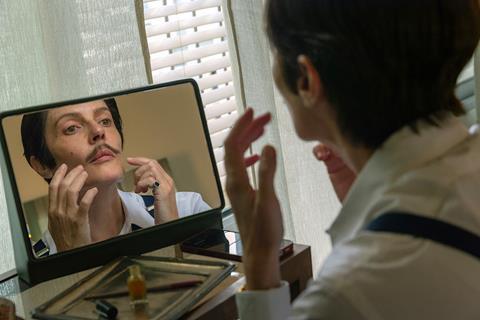Chiara Mastroianni transforms into her father Marcello in this self-reflexive confection from Christophe Honore

Dir/scr: Christophe Honore. France. 2024. 120mins
The resemblance between French actress Chiara Mastroianni and her father, Italian screen legend Marcello Mastroianni – and the lifelong effect it has had on Chiara – is the springboard for Marcello Mio, a fond but arch metafiction from French writer-director Christophe Honoré. Chiara Mastroianni plays herself (or the character of a French actress named ‘Chiara Mastroianni’) who baffles her loved ones, including her mother Catherine Deneuve (played by Catherine Deneuve), by ‘becoming’ her father.
Laborious, somewhat precious
References to the Mastroianni-Deneuve family legend, and to European film history, abound in a film that may well tickle cinephiles, and both Chiara and Deneuve undeniably sparkle in mischievous performances. But viewers not fully invested in the myths are likely to find this a laborious, somewhat precious offering from the often inspired but undeniably erratic writer-director Honoré (Love Songs, Sorry Angel, 2022’s terrific Winter Boy). Expect Marcello Mio to inspire amore in France and Italy, but perhaps falter elsewhere.
The premise is not just that Chiara resembles her dad, but that she has always been in the invidious position of being the child of two screen deities – although, given her illustrious career working with heavyweight auteurs including Manoel de Oliveira, Raul Ruiz and Claire Denis, Chiara is no mere ‘nepo baby’, as per one subtitle here.
The film starts in knockabout mode as a flustered Chiara poses for a Paris photoshoot dressed as her dad’s La Dolce Vita co-star Anita Ekberg in Fellini’s iconic Trevi Fountain scene. Then she looks into the bathroom mirror and finds Marcello staring back at her in black and white. She attends an audition for director Nicole Garcia (playing herself as a manic fussbucket), who demands that Chiara give her more Mastroianni, less Deneuve.
Feeling she has become her father’s ghost, Chiara seems to undergo a personality crisis – or rather embarks on a sustained performance art project, donning a black suit, horn-rimmed glasses and hat to resemble Marcello in Fellini’s 8 ½. She makes a point of speaking Italian and demands that everyone call her Marcello, to the bafflement and sometime upset of Deneuve, as well as Chiara’s real-life exes, actor Melvil Poupaud and actor-singer Benjamin Biolay. By contrast, French screen eminence Fabrice Luchini enthusiastically throws himself into the whole adventure.
Chiara’s picaresque progress takes in several detours, including a live Biolay concert where she sings as Marcello; a sort of tentative romance, again as a man, with a melancholic British soldier (Hugh Skinner); and a trip to Italy. There she appears on real-life TV show A Ruota Libera, where her claim to be the real thing is put to the test by host Francesca Fialdini and actress Stefania Sandrelli, Marcello’s co-star in 1961 commedia all’italiana classic Divorce Italian Style.
By turns flippant and poetic, demystifying and just a touch reverent, the film thrives on whole-hearted collaboration from Deneuve and the other luminaries playing themselves. It even explores some uncomfortable territory, not least Marcello’s reputation as a Don Juan – with Deneuve singing a tender lament, composed by Alex Beaupain, about the pains of their relationship. The subplot with the soldier – inspired, as someone points out, by Luchino Visconti’s film White Nights – fits oddly into the whole, but coheres with Honoré’s long-running themes of gender fluidity and the vagaries of desire.
There are some sharp comic moments. Deneuve announces herself to the proprietor of her old apartment, gets a warm welcome and comments that people are really nice – to which Chiara replies, “They are when you’re Catherine Deneuve.” Deneuve famously has form at sending up her own image – notably in François Ozon’s Potiche, nodded at here – and gives a blithely genial turn, while Luchini impishly lampoons himself as a verbosely erudite fop. As for Chiara, who won Best Actress in Un Certain Regard for Honoré’s 2019 On A Magical Night, she relishes an existentially-charged lead role, exuding charm, mischief and an ambivalent glamour all the more uncanny for channelling her own father’s legendary seductiveness.
Those are the upsides, but for anyone not already fascinated by Euro film lore and the glitter of this particular dynasty, Marcello Mio may seem an over-extended, self-indulgent, somewhat airless affair for the cognoscenti. Chiara Mastroianni’s self-deprecating look at herself may make this a vanity project in reverse, but it’s arguably no less a vanity project for that – however gracefully executed.
Production company: Les Films Pelléas
International sales: MK2 Films, intlsales@mk2.com
Producer: Philippe Martin
Cinematography: Remy Chevrin
Production design: Jeremy Streliski
Editing: Chantal Hymans
Music: Benjamin Biolay, Alex Beaupain
Main cast: Chiara Mastroianni, Catherine Deneuve, Fabrice Luchini, Nicole Garcia















![[L-R]: Amanda Villavieja, Laia Casanovas, Yasmina Praderas](https://d1nslcd7m2225b.cloudfront.net/Pictures/274x183/6/4/1/1471641_pxl_20251224_103354743_618426_crop.jpg)








